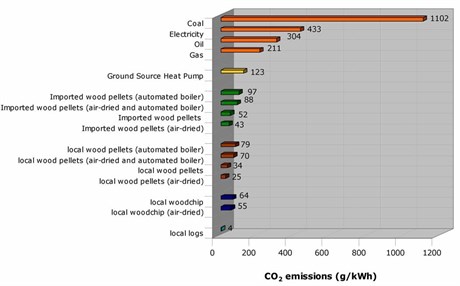Reducing Greenhouse Gas Emissions

Reducing Greenhouse Gas Emissions
One of the major advantages of biomass installations is that they can achieve significant reductions in emissions of carbon dioxide (CO2).
All energy generation emits some CO2. This includes renewable and non-renewable energy sources. For example, conventional heating systems which consume heating oil or natural gas, emit greenhouse gases directly as a consequence of the combustion of the oil. Additionally, indirect greenhouse emissions arise for all other aspects of the complete life cycle of any oil heating system, mainly as a result of fossil fuels being used in fuel extraction, processing and transportation, as well as the manufacture, installation and eventual decommissioning of equipment, plant and machinery.
Wood Fuel is Low Carbon
These considerations also apply to biomass installations. Direct emissions, in the form of CH4 and N2O, arise from the combustion of wood fuel. However, whilst CO2 emissions also occur, an equal amount of this particular greenhouse gas will have been absorbed during the growth of the trees that provide the wood fuel. Hence, in this regard, wood biomass heating systems are often referred to as being ‘carbon neutral’, although technically this should really be ‘low carbon’.
The Supergen ‘Bioenergy: a graphic novel’ has a very useful explanation of whether bioenergy helps us avoid climate change and what is really meant by ‘carbon neutral’.
There are numerous studies on the levels of carbon savings that can be achieved by biomass heating projects. The graph featured below is typical and illustrates the grams of CO2 emitted per kWh of energy supplied from a variety of sources.
Levels of CO2 emitted from a variety of sources

Wood fuels range from 25g/kWh to 97g/kWh. A report carried out by ClimateXChange on greenhouse gas emissions from low carbon heating systems, claims that chip boilers can achieve 0.3gCO2e/kWh. In this instance, carbon dioxide emissions have been assumed as 0, where the production of CO2 from combustion is equal to the amount reabsorbed from the atmosphere.
Rapid grid decarbonisation with the phase out of using coal in power stations has led to an overall gCO2e/kWh of 193(gov.uk Conversion Factors, 2022) for electricity. With heat pumps utilising electricity for heating purposes, and assuming a coefficient of performance of 3.5, emissions from a GSHP can now achieve 55 gCO2e/kWh. It should be noted that heat pump performance varies significantly and is dependent on many factors, one of which is outside ambient air/ground temperature.






